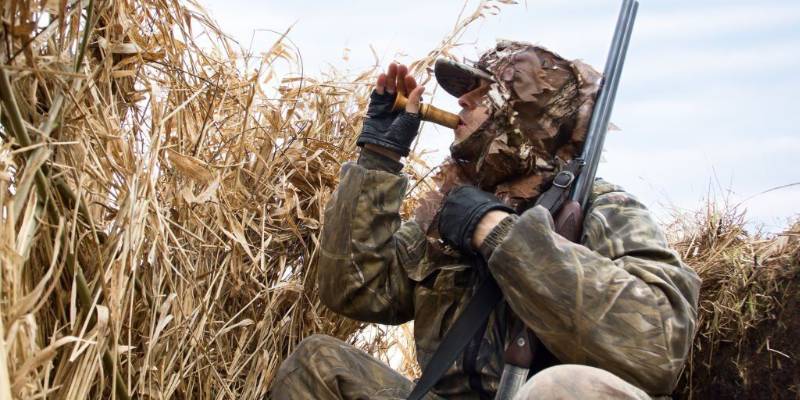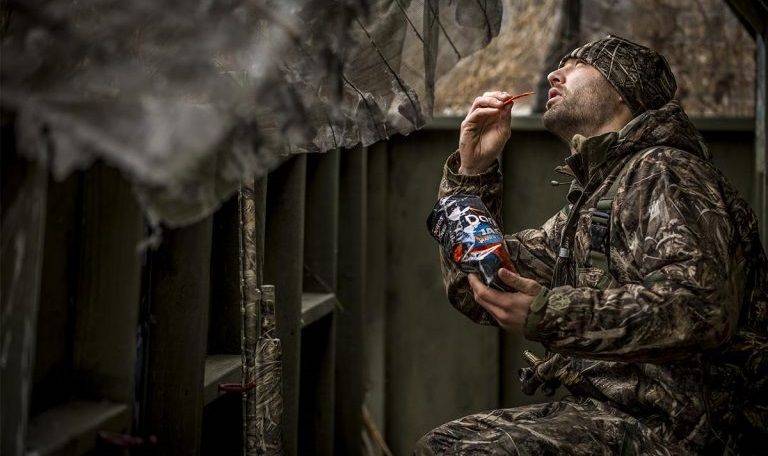
When you hunt pigeons, corvids, or other migrants from a blind, you have probably already seen the birds flee suddenly when they were in the approach phase. This reaction of fear can be due to many things: your team did not convince the birds, an uncollected game that “beats its wing” in the wind, or your hunting blind was not effective. To make sure your hunting blind is perfect, here are the five most important tips on how to stay hidden when hunting.
How to Stay Hidden When Hunting (Step by Step)
Now we’re going to see 5 steps on how to stay hidden when hunting…
1. Choose a Blind That Is Not Visible
Whether you are hunting on the edge of the woods or in the middle of a field, your hunting blind must always blend in with its environment. When hunting birds that are accustomed to your territory, setting up a visible hide like the nose in the middle of the face will immediately put them to flight.
To make a blind invisible to the eyes of birds, several points must be taken into consideration:
- The choice of location: preferably in the shade, if it is in the middle of a plain, the blind should be smaller.
- The choice of camouflage netting: there is no need to use corn-colored camouflage netting on the edge of a wood with green foliage. The color of the net must be adapted to the environment.
- A hunting blind of sufficient size: the smaller the blind, the more discreet it will be. In any case, it is necessary to avoid carrying out a high hunting blind. Ideally, the net should come up to your cap height when you are seated.
- Add vegetation: cut some branches a little away from the location of your blind to improve its camouflage.
- Set up your blind earlier: if you have the possibility, set up your blind several days before the hunting day. The birds in your territory will have become accustomed to it and will be more confident.
2. Avoid Remaining Standing
A mistake made by many hunters of migrants when they hunt on the lookout: they remain permanently upright. As we explain above, your hunting blind must be made and adapted to offer you visibility when you are seated. Standing up, when you spot an approaching bird, it means it has seen you too.
In a hunting blind, not only for your comfort but also to achieve more success, use a seat. You must be seated and your camouflage net installed at the height of your cap.
3. Don’t Move Too Many
The movement will attract the attention of the approaching bird. Sensing a threat, he will immediately flee. You can very easily hide your small movements from the birds’ eyes: grab your weapon, your calls, and activate the mechanisms for pigeons, … If you use a net that is not sufficiently opaque, you just need to add a second net camouflage over it.
Another trick is to deliberately add movement to your rig in order to focus the birds’ attention on it and not on your stalk. In all cases, avoid sudden movements and untimely movements.
4. Don’t Make Yourself Shine
A point often overlooked by many migratory hunters…
Birds are particularly sensitive to shiny objects that are not a sign of safety for them. First of all, to avoid shining, prefer to position your hide with the sun behind you. Leave your gun safely on a lookout post until the last moment, and avoid shaking it when a pigeon approaches, it’s like waving a white flag signaling your position.
The contrast of your skin with the environment is also very blatant for birds. Wearing a hat, cap or balaclava will darken your face. Gloves can also be very useful in some cases.

5. Don’t Make Too Much Noise!
When we hunt together, we like to tell stories. It is an integral part of the hunt and of the passion. Unfortunately, birds are also sensitive to noise. It is of course not forbidden to talk and exchange in a blind, but it is also useless to shout and speak loudly. If you have to yell so your post neighbor can’t hear you, reduce the size of your lookout.
Conclusion
That’s our today’s guide on how to stay hidden when hunting. However, safety rules are ESSENTIAL. Even if your weapon is not new to you, a visit to the stand will allow you to check that your riflescope is correctly adjusted. Repeating the instructions won’t hurt.
Thank you for reading.
Frequently Asked Questions (FAQs):
Wear camouflage clothing that matches the environment where you’ll be hunting. Opt for patterns that break up your silhouette and blend with the surroundings. Consider scent-free clothing to minimize odor.
Scent control is critical. Use scent-free soaps and detergents, and store your hunting clothes in a scent-free container. Consider using scent-eliminating sprays while in the field, and always hunt with the wind in your favor.
Is it necessary to use a blind or tree stand for concealment?
Using a blind or tree stand can significantly enhance your concealment. Choose a location that provides natural cover, and use blinds or stands that match the surrounding vegetation.
How can I use natural cover to my advantage?
Position yourself against natural cover, such as trees, rocks, or bushes, to break up your outline. Avoid skyline positions that make you more visible to game animals.
How can I minimize noise while hunting?
Choose quiet clothing and gear, and move slowly to minimize noise. Pay attention to your surroundings and be mindful of steps on leaves, twigs, or other noisy surfaces.
Dawn and dusk are optimal times for hunting, as the low light conditions make it more challenging for game animals to spot you. Plan your movements and setups accordingly.
What should I do if I get spotted by game animals?
Stay still and avoid making sudden movements. Use natural cover to your advantage, and wait for the animal to become more relaxed before attempting any further actions.
Hope this guide helped you. Have any questions? Leave a comment below and we will answer them.